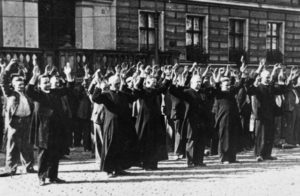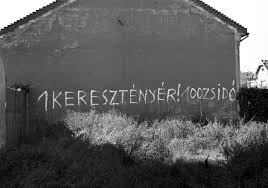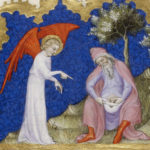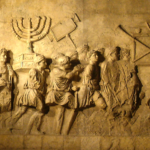The Holocaust was a deliberately planned genocide of what Hitler termed inferior members of the human race; these included Jews, gypsies, Jehovah’s Witnesses, and homosexuals. During 1941-44 six million Jews were systematically slaughtered horrifically under Hitler’s regime. Initially, the Jews became outcasts within their own society. They were enforced to wear a Star of David, were imprisoned, and transported to camps via cattle wagons.
 Within the camps, the Nazi’s aim was to strip their victims of all humanity and individuality before murdering them. The children, pregnant mothers, the sick, and the elderly were killed automatically on arrival, and the strong individuals were worked to death. The Nazis reused the Jews’ belongings and recycled their hair, gold fillings, and their ashes were used as fertilizer. Jews today do not accept the term Holocaust, they refer to this attempted annihilation of their people as the Shoah; destruction.
Within the camps, the Nazi’s aim was to strip their victims of all humanity and individuality before murdering them. The children, pregnant mothers, the sick, and the elderly were killed automatically on arrival, and the strong individuals were worked to death. The Nazis reused the Jews’ belongings and recycled their hair, gold fillings, and their ashes were used as fertilizer. Jews today do not accept the term Holocaust, they refer to this attempted annihilation of their people as the Shoah; destruction.
Frank Cottrell Boyce has in recent years written the screenplay God on trial’. It is set in Auschwitz; there is a roomful of captured Jews who know that by morning half of them will die. The characters have chosen to depict a range of social classes, and their faith varies from the strong belief of the Rabbi to the Jewish guard who has denied God. They decide to put God on trial. Three judges are selected and the rest are invited to give evidence. Their arguments stem from their Jewish history and theology, and personal experience. The verdict: God is guilty of breaking his Covenant with his Chosen people and siding with Hitler. Certain issues referred to in the screenplay reflect arguments raised by Jewish theologians and survivors who have written extensively on the consequences of the Shoah. A major area of discussion is who is to blame for the Holocaust. Two theories will be explored in this article.
Who are to blame for the Holocaust
There are Jews who hold the belief that their people are to blame for the Holocaust. This has a scriptural basis; they are being punished by an angry God as a result of their sin. The Torah shows that suffering is a huge part of Jewish history; their righteous God habitually deserts His Chosen people as a result of their disobedience. When questioned about the thousands of innocent children slaughtered, supporters of this view reply that in the past God has destroyed the innocent many times to prove that He is the one and only God, for example, the firstborn of Egyptians. The Holocaust, therefore, is a process of purification. It is yet another event of atonement for the Jewish race, following on from the flood, their exile into Babylon and the destruction of the Temple. Heinrich Gruber noted that throughout Jewish history God has chosen certain individuals to punish his people, ie Nebuchadrezzar. He believed therefore that God worked through Hitler to punish the Jews, who must have been guilty of breaking God’s law.
 Critics, including myself, however, argue that if this was the case the punishment is unbelievably disproportionate in relation to the crime’. The collective sins of the six million were not equal to the torture and carnage they experienced. There were unborn and young children amongst the six million. This could never be seen as an act of a just God; it is a theory that is insulting to God, but more importantly to the Jewish martyrs.
Critics, including myself, however, argue that if this was the case the punishment is unbelievably disproportionate in relation to the crime’. The collective sins of the six million were not equal to the torture and carnage they experienced. There were unborn and young children amongst the six million. This could never be seen as an act of a just God; it is a theory that is insulting to God, but more importantly to the Jewish martyrs.
Ignaz Maybaum was a survivor of the Holocaust who lost his family. He also disagreed with this harsh view. He argued that it was not punishment for the sins of the Jewish people; instead, it was a Jewish version of the Christian Crucifixion. The six million suffering victims died for the sins of others. Steven T. Katz has critiqued Maybaum’s theory; he did not hold that the two events could be compared to one another. At Calvary the Word of God suffers on the cross to save the whole of mankind, however, according to Maybaum in Auschwitz God wills this horrendous suffering on the six million so that they may save the rest of the Jewish people.
In God on trial’ a second theory is raised regarding who is to blame for the Holocaust. A few members of the group disagreed that the Jews were at fault. They believed instead that God was deserting them, and had broken the Covenant with His people and made a new Covenant with Hitler. This was the final conclusion of the trial. Those who supported this view turned to the Torah for historical evidence of God’s cruelness, for example, God’s harsh treatment of King Saul and David as a result of disobedience. This evidence coupled with the fact that the Nazis wore the emblem God with us’ on their belts, resulted in the belief that God had deserted them.
Survey on Jewish survivors
Reeve Robert Brenner in the 1970s conducted a survey asking Jewish survivors questions about changes in their religious belief as a result of their experiences. One response from Orthodox Jews was that they did, in fact, believe that “the Holocaust was God’s punishment for Jewish refusal to honor their historic covenant with the God who made them a chosen people.” Brenner also concluded from his research that the reason for the increase in atheism was “an emotional reaction, an expression of deep hurt and anger against God for leaving Jews so radically abandoned.”
 Although this is viewed by many to be a logical and credible theory, one which is supported by biblical evidence, and personal response, I do not believe that this horrific carnage could have been an act of God. In addition, Brenner’s survey showed that “more than 70% of those who responded to that issue set aside any interpretation that linked the Holocaust to God’s wrath Holocaust, they stressed, was humanity’s doing, not God’s27% believed it is inappropriate to blame God for the acts of man.”
Although this is viewed by many to be a logical and credible theory, one which is supported by biblical evidence, and personal response, I do not believe that this horrific carnage could have been an act of God. In addition, Brenner’s survey showed that “more than 70% of those who responded to that issue set aside any interpretation that linked the Holocaust to God’s wrath Holocaust, they stressed, was humanity’s doing, not God’s27% believed it is inappropriate to blame God for the acts of man.”
Summary of the Consequences of the Jewish Holocaust
In summary, there have been countless consequences of the Jewish Holocaust, a few of which have been discussed in this article. Survivors and theologians have written an emotive array of material on the event, and all the issues which have arisen from it. As individuals and as a people the Jews have had to come to terms with the Shoah in their own way. In some cases, their faith in God has been shaken and radically altered, in others, their belief in their fellow man has been considerably shaken. The world was profoundly affected by this catastrophe and will never be the same again as a result, as neither will the Jewish nation. I believe the question of who’s to blame can never be truly answered and will continue to haunt mankind.
(The survey results were cited from R Rubenstein & J Roth, Approaches to Auschwitz, SCM, 1987)






